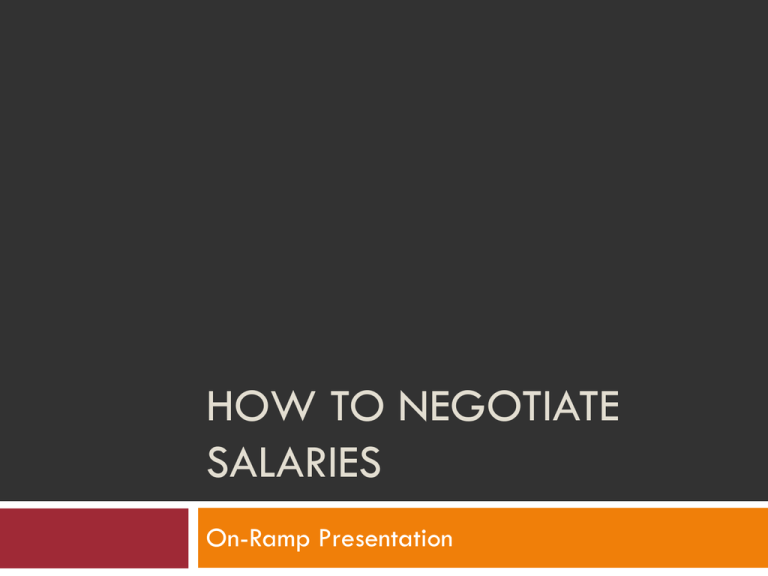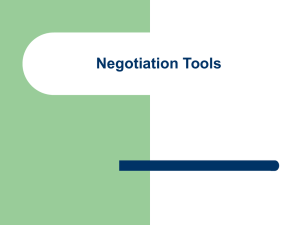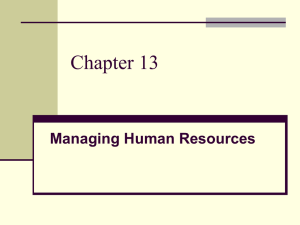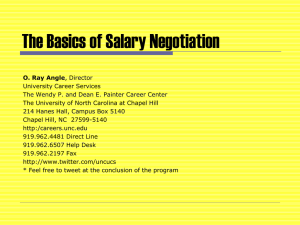How To Negotiate Salaries
advertisement

HOW TO NEGOTIATE SALARIES On-Ramp Presentation In a Nutshell . . . Research the typical salary for the position in your area before you go to the interview. Don’t underestimate your worth. Consider all the benefits and ask questions before you accept an offer or negotiate a better salary Be polite but firm. VIDEO Before You Get A Job Offer Do Your Homework! •You need to have some idea of what salary to expect. •You need to know this information to be able to respond appropriately. The Virginia Wizard Salary Ranges Salaries in Your Field & Industry • Read the trade journals for your industry. • Read the newspaper Help-Wanted ads. • Talk to an employee in the field. • Take a salary survey on the Web. Just type in “salary survey”. • Use your network to find out what others make at the same level. •Talk to alumni of JTCC. Other Website Resources Also Consider . . . Salaries vary by geographic region. For example: A teacher in southern Virginia may earn a lower salary than a teacher in northern Virginia. Find out what a job pays where you plan to work. *NOTE: There is generally a relationship between the local cost of living, the salary and the supply of and demand for workers with a specific set of skills. Deciding To Negotiate First assure the interviewer of your interest. •Give reasons for your proposed increase rather than just saying you need it or want it. •Be ready to listen to what the company has to offer and give it consideration. •Set realistic expectations and realize that you may not get everything you want. • How To Negotiate – 8 Steps Most job seekers are anxious about salary discussions and want to get it over with as soon as possible. Open Negotiations If you don't ask, you won't get. It's surprising how many people hardly negotiate at interview and, during employment, fail to negotiate a pay raise. Initial very low offers may force us to negotiate but those who are always ready to negotiate, whatever the situation, are likely to achieve higher salaries. One early study of graduating MBA students found that those who were prepared to negotiate achieved better starting salaries (Gerhart & Rynes, 1991). It's pretty obvious advice but it's amazing how many people fail at the very first hurdle. Set The Anchor Oddly, articles on this subject often recommend waiting for the other side to open the bidding. This may work in auctions but according to research on salary negotiation, this is wrong. The first number that gets mentioned is important because it acts as an anchor against which other numbers are judged. If you allow the other side to set the anchor then they will set it low and grab control of the negotiation. Studies find that, whether consciously or otherwise, this first offer sets the tone for the whole negotiation. Start High When you mention a number, make sure it's high—that is, high in the context of the industry you work in, obviously it shouldn't be ridiculous. One study of simulated salary negotiations has found that when the anchor figure is set high, the final negotiated amount is likely to be higher (Thorsteinson, 2011). Make a Joke One potential problem with making high opening offers is that employers can take it the wrong way. Tension can be diffused, though, by making a joke about, for example, 'unrealistic salary expectations'. There is evidence in the negotiation research that humor— when used appropriately—can be an effective negotiation tactic. Remember that even when framed with humor, a high opening number can still influence the ultimate decision (Thorsteinson, 2011). Be Bold A personality trait that's central to negotiation is being confident. Those who aren’t confident may see you as arrogant so, be careful. However, if you’re a confident person, don’t be afraid to let your confidence show in a professional manner. Believe You’re Worth It A common stumbling block in salary negotiations is thinking you're not worth it. So it's vital to convince yourself that you are worth it. Try to find out what other people are getting paid for doing the same job. If it's more, then you are worth more. If it's not more, then think of why you specifically should earn more. With that in mind you can go into your salary negotiation with an anchor in mind, a joke to ease the tension and the willingness to take a risk to make a substantial gain. Is There Some “Wiggle Room”? Make sure you have a figure in mind because if the recruiter does have room to barter, she will ask you pointblank to supply a figure. When you’re asked that question, don’t tip your hand by giving an exact figure. You don’t want to take yourself out of the running – too high or too low. Instead of naming your price, say something like, “Based on my experience and skills and the demands of the position, I’d expect I’d earn an appropriate figure. Can you give me some idea what kind of range you have in mind? Wiggle, Wiggle . . . The recruiter may come back with, “Well, how much were you interested in?” *NOTE: This can go on and on so, don’t take it too long and risk antagonizing the other person. If you can’t get the recruiter to name a price, give in graciously and name your own. If you name a range ($25,000 to $30,000) it may be that the company was considering a range of $22,000 to $28,000. Therefore, you should receive an offer in the mid-to-upper end of your range, depending on your experience and qualifications. Important To Note When considering compensation, don’t forget to look at the entire package. That includes health insurance, vacation time, sick days, and personal days. If the actual dollar amount you are being offered seems somewhat low, is it being made up with very generous vacation time or with a paid-in-full health insurance plan? Don’t forget that these things are valuable, too. How To Negotiate a Salary Increase In A Tough Economy In difficult times, getting a raise is hard but not impossible. Employees are valuable assets that a company does not want to lose. Hiring, training and overhead costs may make the expense of hiring someone to replace you greater than the cost of your improved salary. Align your goals to those of your company and use good negotiating tactics to win a raise in tough economic conditions. #1 Request an appointment with your supervisor to talk about your performance and goals. #2 Look over your complete salary and benefits package to make sure you understand the details of your compensation. Check with your human resources department if necessary. Your boss may offer you improved benefits rather than a salary increase. #3 Review your calendar and other records and make a list of your major accomplishments over the past several months. Compare your achievements to your company's goals and point out how you are specifically supporting the organization's mission. #4 Make a list of ways you have gone beyond your job description recently. If you have taken on tasks for a colleague who is on leave or are handling work that's usually done by someone higher in the organizational chain of command, mention it. #5 Write down after-hours education or training opportunities you have pursued. This demonstrates your commitment to the job and your willingness to grow. #6 Do some research to clarify the salary range for your job within your industry. Look to the U.S. Bureau of Labor Statistics and its "Occupational Outlook Handbook," check with friends who work for other companies, and ask executive search professionals to get a realistic idea of the raise you should ask for. A request that's not in line with the realities of your industry will make your supervisor question your judgment. #7 Be direct about your desire for a raise when you meet with your boss. Don't be hesitant or apologetic. Avoid starting with your reasons for requesting a raise, making you sound unnecessarily defensive. Phrase your request positively and professionally. #8 Ask what you can do to improve enough to gain a raise if your request is refused. Ask as well if the company can offer other benefits -vacation days, education expenses and so on -- in lieu of a salary bump. Get It In Writing Be suspicious of an employer who won’t give you confirmation of the position in writing. Q&A








